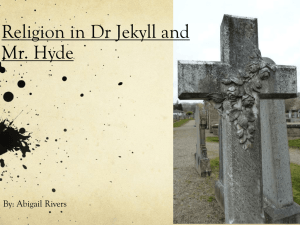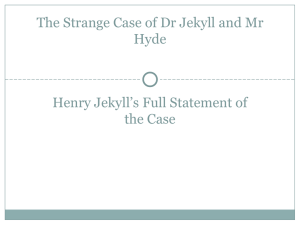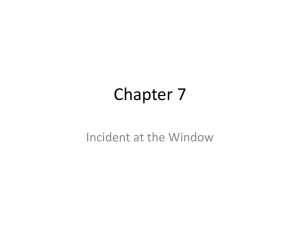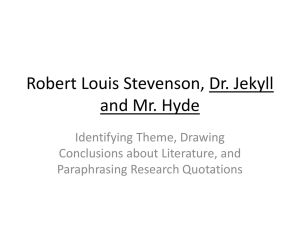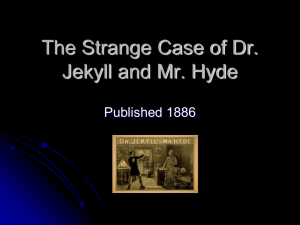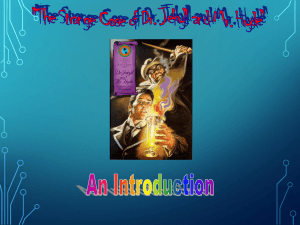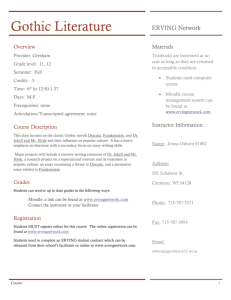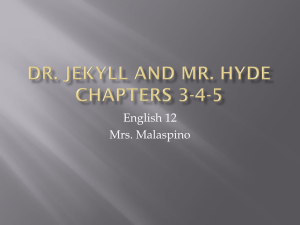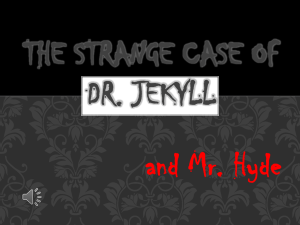Lycée de la Côtière Strange Case of Dr. Jekyll and Mr. Hyde (Robert
advertisement
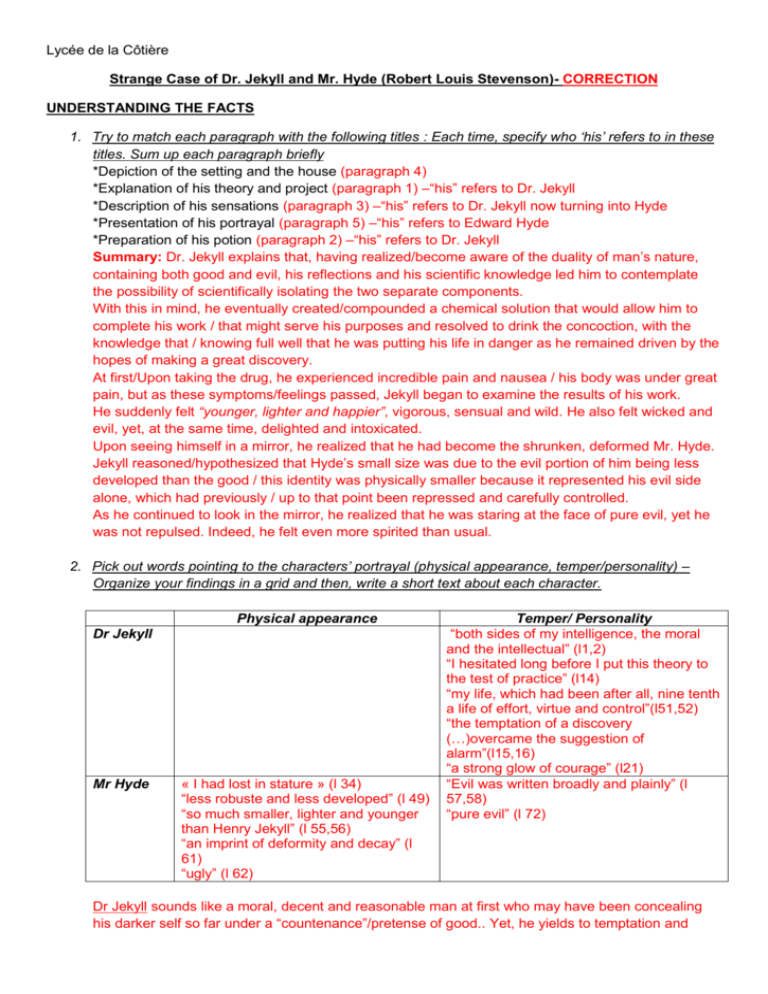
Lycée de la Côtière Strange Case of Dr. Jekyll and Mr. Hyde (Robert Louis Stevenson)- CORRECTION UNDERSTANDING THE FACTS 1. Try to match each paragraph with the following titles : Each time, specify who ‘his’ refers to in these titles. Sum up each paragraph briefly *Depiction of the setting and the house (paragraph 4) *Explanation of his theory and project (paragraph 1) –“his” refers to Dr. Jekyll *Description of his sensations (paragraph 3) –“his” refers to Dr. Jekyll now turning into Hyde *Presentation of his portrayal (paragraph 5) –“his” refers to Edward Hyde *Preparation of his potion (paragraph 2) –“his” refers to Dr. Jekyll Summary: Dr. Jekyll explains that, having realized/become aware of the duality of man’s nature, containing both good and evil, his reflections and his scientific knowledge led him to contemplate the possibility of scientifically isolating the two separate components. With this in mind, he eventually created/compounded a chemical solution that would allow him to complete his work / that might serve his purposes and resolved to drink the concoction, with the knowledge that / knowing full well that he was putting his life in danger as he remained driven by the hopes of making a great discovery. At first/Upon taking the drug, he experienced incredible pain and nausea / his body was under great pain, but as these symptoms/feelings passed, Jekyll began to examine the results of his work. He suddenly felt “younger, lighter and happier”, vigorous, sensual and wild. He also felt wicked and evil, yet, at the same time, delighted and intoxicated. Upon seeing himself in a mirror, he realized that he had become the shrunken, deformed Mr. Hyde. Jekyll reasoned/hypothesized that Hyde’s small size was due to the evil portion of him being less developed than the good / this identity was physically smaller because it represented his evil side alone, which had previously / up to that point been repressed and carefully controlled. As he continued to look in the mirror, he realized that he was staring at the face of pure evil, yet he was not repulsed. Indeed, he felt even more spirited than usual. 2. Pick out words pointing to the characters’ portrayal (physical appearance, temper/personality) – Organize your findings in a grid and then, write a short text about each character. Physical appearance Dr Jekyll Mr Hyde « I had lost in stature » (l 34) “less robuste and less developed” (l 49) “so much smaller, lighter and younger than Henry Jekyll” (l 55,56) “an imprint of deformity and decay” (l 61) “ugly” (l 62) Temper/ Personality “both sides of my intelligence, the moral and the intellectual” (l1,2) “I hesitated long before I put this theory to the test of practice” (l14) “my life, which had been after all, nine tenth a life of effort, virtue and control”(l51,52) “the temptation of a discovery (…)overcame the suggestion of alarm”(l15,16) “a strong glow of courage” (l21) “Evil was written broadly and plainly” (l 57,58) “pure evil” (l 72) Dr Jekyll sounds like a moral, decent and reasonable man at first who may have been concealing his darker self so far under a “countenance”/pretense of good.. Yet, he yields to temptation and seems rash in his bold ambition (“flushed as I was with hope and triumph” (l40). We can imagine that before turning into Hyde, he was a smart, elegant and quite handsome/good-looking man. Hyde is portrayed as a small/shrunk, ugly, deformed somewhat powerless being that causes everyone he meets to be filled with revulsion. Hyde’s appearance is a plain reflection of his evil nature. His name is quite appropriate, for he truly hides and is hidden by Jekyll. 3. What were the character’s motivations to carry out this experiment ? Comment on the title given to this extract. Cf. l. 7-11: “life would be relieved of all that was unbearable”,“delivered from the aspirations and remorse”,“no longer exposed to disgrace and penitence” Jekyll asserts that “man is not truly one, but truly two,”and he imagines the human soul as the battlegroundfor “the just”, “more upright twin” and “the unjust”,“extraneous evil,” each struggling for mastery. Jekyll undertakes his experiment with the intent of dissociatinghis good side from his bad one and vice versa. He believes that man would be all the better if the two separate entities he is made up of could be made independent and no longer interfere with each other. INTERPRETING 1. What atmosphere prevails in this scene ? How is it conveyed ? The atmosphere that prevails is one of mystery, secrecy and tension/expectancy/anticipation. It is a “gothic” atmosphere! The tremendous ambition of Dr. Jekyll, coupled with his curiosity, enables him to make a shocking and unheralded discovery. The experiment is said to take place “late one accursed night”, suggesting that it may be doomed / bring about some form of malediction or misfortune / cause harm. 2. Focus on lines 22 to 34 : How is Dr. Jekyll’s feverish excitement/exhilaration conveyed ? (literary devices) Tension builds up as Dr. Jekyll’s feverish excitement/ exhilaration is conveyed in his narration of the experiment and its outcome, through the use of emphatic phrases such as “with a strong glow of courage”, “a horror of the spirit that cannot be exceeded”, “indescribably new”, “incredibly sweet”, “a heady recklessness”, “running like a millrace”, “braced and delighted me like wine”,“exulting”, “fushed as I was with hope and triumph”. + the accumulation of short phrases. 3. How is suspense maintained for the reader ? Suspense is maintained as the reader (as well as Dr. Jekyll himself) is literally kept in the dark as to the visible effects of the potion. At first, there is no mirror for Dr. Jekyll to check whether his appearance has changed as a result of his new sensations. No one has witnessed the experiment, which has been carried out in deliberate secrecy as suggested in the sentence l. 38-39 (with the words “inmates” and “locked” conjuring up a frightening carceral atmosphere). There is also something uncanny/eerie in the narrator’s evocation of “the constellations look[ing] down upon [him] […] with wonder” as he “stole through the corridors, a stranger in [his] own house”. We are made to feel that his new appearance is awesomely mysterious and possibly doomed (the stars may well be construed as the eye of god or fate). 4. Analyse the role that the preparation of the potion (paragraph 2) plays in this extract. What does this experiment remind you of ? In what way can you say there is a paradox between the preparation itself and Jekyll’s aim ? Not only does the evocation of the preparation heighten suspense, as one is eager to know whether the experiment will prove successful, it also anchors the experiment in a realistic, scientific background.The overall effect is probably to lend credibility to the experiment. Paradoxically enough though, one cannot help noticing that the preparation of the potion consists in a process of combination (“I compounded the elements”) whereas Jekyll’s aim is to achieve some form of organic dissociation. The experiment is also quite reminiscent of some magic enactment of witchcraft or alchemy.(cfgothic fiction rooted in medieval romances). The smoke emanating from the boiling liquid makes the “tincture” look like some dangerous magic potion. 5. Focus on lines 61 to 67 : Describe the relationship between the characters We learn about Jekyll’s reaction when he looks at himself in the mirror and considers his new self/appearance. There seems to be a feeling of mutual recognition passing between the two “characters”. Jekyll is willing to accept Hyde as a part of himself whereas, as he later says, everyone Hyde meets is repulsed by the evil that emanates from him. He is obviously fascinated by his new image, which he calls an idol. 6. Which elements can be identified as distinctive features of the Gothic Genre ? Answer briefly but quote the text to support your answer. Several elements can be identified as distinctive features of the gothic genre: the setting and its pervading darkness, the isolation of the protagonist in a confined place (the laboratory, corridors), strange events taking place, and the transgression of moral codes, arousing a feeling of awe – that is a combination of dread/fear and wonder/admiration. 7. Compare with the other texts studied in class. Where is the source of Evil here ? The source of evil is interiorized as it is to be found within the narrator himself, and emerges as his monstrous double. What are the common points between this piece of fiction and Mary Shelley’s Frankenstein? -the setting: a laboratory -the new theme: the danger of science: Both Stevenson and Shelley may have wanted to level/ direct criticism against those scientists who do not know how to control the forces they unleash, suggesting that those who pursue science with obscure goals have an onerous responsibility. Duplicity/the monstruous double: Hyde as Jekyll’s evil side / The creature: image of the creator (Who’s good, who’s evil?)
